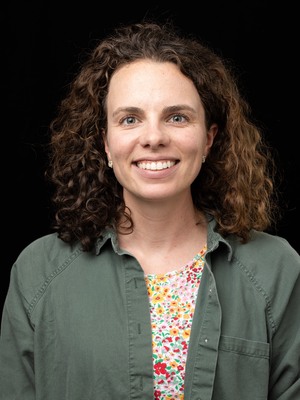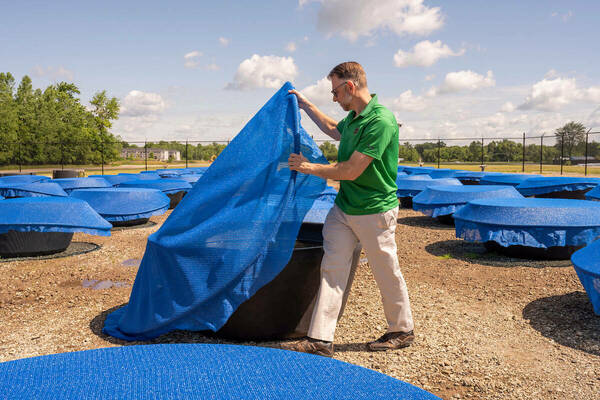Ecological Society of America awards honors for research papers from Rohr, McLachlan labs
Researchers in the Department of Biological Sciences at the University of Notre Dame have been honored with awards from the Ecological Society of America (ESA) for their research.

Jason Rohr, the Ludmilla F., Stephen J., and Robert T. Galla College Professor and Chair of the Department of Biological Sciences, received the ESA’s 2024 Sustainability Science Award. Rohr and his postdoctoral researcher, Sidy Bakhoum, as well as other co-authors, were honored for the paper in Nature, “A planetary health innovation for disease, food, and water challenges in Africa.” The paper examines how sustainable practices, such as removing invasive aquatic vegetation, both enhances human nutrition by converting the material to compost and reduces disease risk by clearing out habitats in which parasite-carrying water snails thrive.
“It is exciting that we can improve sustainable development without having to compromise health and well-being,” said Rohr.
The ESA’s prize is not the first for this research: Rohr’s highly-cited study was also the national champion for the Frontiers Planet Prize from the Frontiers Research Foundation.
The second award was granted to former graduate student and lead author Megan Vahsen, who worked in the lab of Associate Professor Jason McLachlan. The ESA honored her and collaborators with the ESA’s George Mercer Award for their research paper in Science, “Rapid plant trait evolution can alter coastal wetland resilience to sea level rise.” The Mercer Award honors an outstanding ecological research paper published by a lead author who is under 40 years old — in this case, Vahsen.
The paper provides rare empirical evidence that evolution can work fast enough to alter plant traits that impact the resilience of ecosystems. Vahsen and collaborators showed how the rise of coastal nutrient pollution over the 20th century pushed natural selection to favor shallower roots. Key plant traits, like rooting depth, changed over the 20th century in ways that made their coastal wetland homes more vulnerable to sea-level rise, according to McLachlan.

Vahsen previously won Notre Dame's Shaheen Graduate School Award in 2023, and will be an assistant professor in Odum School of Ecology at the University of Georgia in 2025. The list of past Mercer Award winners includes some of the most important ecologists in history. In fact, George Odum, for whom the school of ecology at Georgia is named, received the honor in 1956.
“Being recognized as a Mercer Award recipient is a huge honor for me and my co-authors, especially at this point in my career,” Vahsen said. “I feel incredibly honored to have our work added to the list of previous Mercer Awardees, whose papers I have read and cited throughout my career thus far.”
Rohr’s and Bakhoum’s research was funded by the National Institutes of Health, the National Science Foundation, the Indiana Clinical and Translational Sciences Institute, and a Stanford seed grant. A complete list of co-authors can be found on the paper at Nature.
McLachlan’s and Vahsen’s research was funded by the National Science Foundation, the United States Coastal Research Program, and the Coastal Carbon Research Coordination Network. A complete list of co-authors can be found on the paper at Science.
John LeSage also contributed to this article.
Originally published by at science.nd.edu on May 30, 2024.
Latest Research
- U.S. states impact foreign policy amid national China unease, research showsState-level officials such as governors, state legislators, and attorneys general are shaping U.S.-China relations as the two countries navigate a strained geopolitical relationship, according to new research by political scientist Kyle…
- CI Compass leads archiving, long-term data preservation conversation at 2024 NSF Research Infrastructure WorkshopAs scientific data at U.S. National Science Foundation (NSF)-funded mid-scale and major facilities continues to grow exponentially with the help of advanced instrumentation and increased computing power, the challenge of preserving, archiving, and keeping that data accessible grows with it. In March,…
- Thirty-four students and alumni awarded Fulbright grantsNearly three dozen University of Notre Dame students have been named finalists, and another eight alternates, for the 2024-25 Fulbright U.S. Student Program. The finalists include 26 undergraduate students and eight graduate students.
- Colin Barr appointed next Thomas Moore and Judy Livingston Director of the Keough-Naughton Institute for Irish Studies.Colin Barr has been appointed the next Thomas Moore and Judy Livingston Director of the Keough-Naughton Institute for Irish Studies, effective January 1, 2025. A distinguished historian…
- Notre Dame political and computer scientists probe authoritarian regimes’ use of social media to attack democracy“Authoritarian regimes — like Russia, China, and Iran — are actively using social media platforms to spread misinformation, and this has real-world impacts,” said Karrie Koesel, associate professor of political science at the University of Notre Dame. “To protect democracy at home and abroad, we must understand the different ways it is being attacked.”
- Seeking evidence-based policy, economist investigates how anemia impacts education for adolescents in IndiaIn low- and middle-income countries, anemia reduction efforts are often touted as a way to improve educational outcomes and reduce poverty. A new study, co-authored by a Notre Dame global health economics expert, evaluates the relationship between anemia and school attendance in India, debunking earlier research that could have misguided policy interventions.












